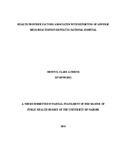| dc.description.abstract | In the study of international conflict management, special interest in post-conflict peace building
was developed since the question of peace-building has become the major focus in the
contemporary world and more especially in the African continent, whose countries have suffered
one civil war after the other, and therefore disturbing the societal balance in these countries.
Various measures have been undertaken to try and reconstruct these post conflict societies and
these include a whole range of what can be termed as peace support operations. They include:
socio-economic reconstruction, restoration or reconstruction of democratic institutions of
governance, police reforms, security sector reforms and DDR. Focus is on the implementation of
DDR as part of the post-conflict peace process. The problem identified by the researcher is that
most of these programs kick off but are rarely completed. Even those that get completed do not
record much success. This study therefore has tried to find out what really happens that the
programs do not succeed. It tries to find out what challenges are encountered in the
implementation of DDR programs that impede the success.
The objectives for this study therefore include finding out whether DDR can succeed in restoring
a post conflict society into peace, to find out what factors contribute to the failure of DDR, and to
uncover what can be done in order to attain successful DDR.
From the findings of this research, DDR programs fail because of a few logistical,
methodological and political challenges in the whole process from the preparation to the
implementation phase. Although this is a single case study, it appears to be representative of
what many DDR programs have suffered especially in Africa which happens to attract many
actors with different interests, hence creating problems such as conflict of interest, funding
challenges, issues of timing for the programs, as well as local capacity issues. | en_US |

